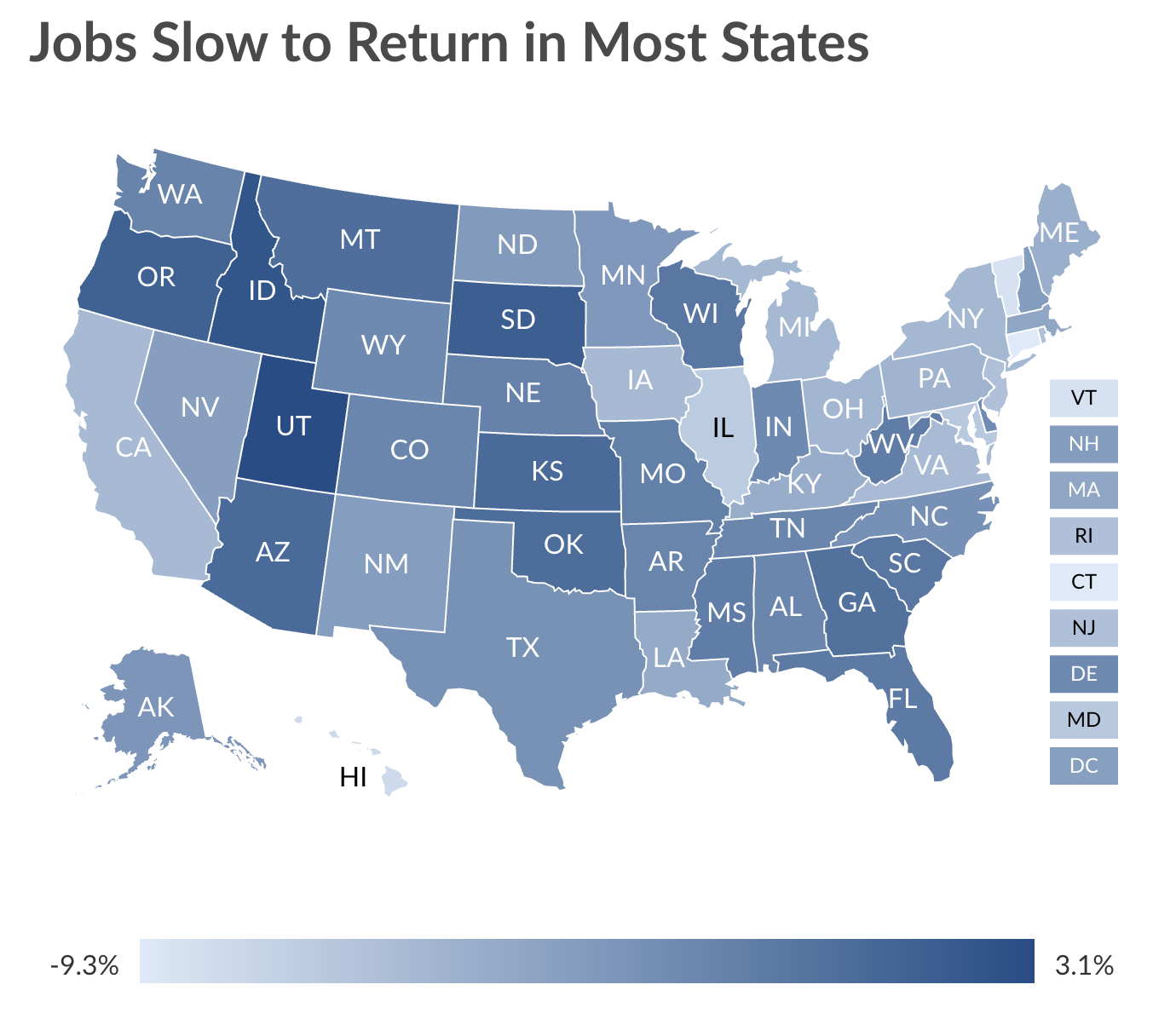
Head waitstaff Laurie Mitchell sanitizes a countertop at Rodd's Restaurant in Bristol, Connecticut, in December. New England states are the slowest to recover jobs during hiring problems for workplaces that require public contact amid the pandemic's delta variant surge. Jessica Hill/AP
In-Person Workers Are Slow to Return to Jobs, Data Shows
"You can’t pay somebody enough to show up at work when there’s a kid at home.”
This story was originally posted by Stateline, an initiative of the Pew Charitable Trusts.
Donald Trinks is seeing both sides of the labor problem in his restaurant: less business from travelers and not enough workers to capitalize on the business he has left.
More people want to eat in his restaurant, Bart’s Drive-In in Windsor, Connecticut, but Trinks has to close on Wednesday and Thursday nights because he can’t find enough workers. At the same time, his catering business is down because business travel has evaporated with the surge of the coronavirus delta variant.
“We do a lot of business catering, and there’s a lot less business meetings and people coming in from out of state,” said Trinks, who is also Windsor’s mayor.
Connecticut is one of the mostly Northeastern states slowest to recover jobs after the pandemic. Hospitality workers and others who can’t telework are key to job recovery because, despite a sudden spike in demand for their services in a reopened economy, many are reluctant to return to the workplace. They’ve been burned by layoffs, helped by extended unemployment benefits that just expired, and face hurdles such as child care uncertainty as schools reopen and the delta variant continues to frustrate expectations.
Some employers are paying higher wages or offering other incentives to lure back workers, but that may not be enough if employees, for example, can’t find child care.
“You can’t pay somebody enough to show up at work when there’s a kid at home who needs care,” said Curtis Dubay, senior economist at the U.S. Chamber of Commerce.
Workers also may see layoffs looming again as the delta variant prompts people to cancel business trips. In an August survey, two-thirds of business travelers said they were cutting back on trips, and most didn’t plan to reschedule.
The number of jobs is down about 9% in Connecticut and Vermont from pre-pandemic levels as of July, and down significantly in Hawaii (8.1%), Illinois (6.9%), Maryland (6.7%), New Jersey (6.1%) and Rhode Island (6.1%), according to a Stateline analysis of Bureau of Labor Statistics data.

“We have a clear mismatch between workers and employers, and it’s not clear what will change the situation,” said Joyce Manchester, senior economist for Vermont’s Legislative Joint Fiscal Office. Restaurants, hotels and child care centers in Vermont have struggled to find workers; some have cut operating hours, she added.
Nationally, hospitality job growth halted in August and is still down 1.7 million jobs from before the pandemic, according to a federal jobs report released Sept. 3.
Overall job growth was sluggish in August at 235,000, compared with an increase of more than 1 million in July, and was still 5 million jobs short of pre-pandemic levels. July data showed a record 10 million job openings, with demand especially high for in-person jobs such as hospitality, manufacturing and construction.
The few states that have more jobs than they did before the pandemic are fast-growing, mostly Western states with booming economies, scenic beauty and a relatively low cost of living. Utah gained almost 50,000 jobs or about 3% since July 2019, and Oregon gained almost 30,000 or 1%. Arizona and Idaho were close behind with about 20,000 jobs added.
Utah benefited from a young population less susceptible to COVID-19 and does not face the retirement issues seen in New England and other aging areas, said Mark Knold, chief economist for Utah’s Department of Workforce Services.
“There’s a strong in-migration attraction because of the Rocky Mountains’ beauty and recreation,” Knold said. “It’s not just a Utah thing, it’s an intermountain West thing.”
New England states have more affluent, older residents who may have decided to retire early to avoid the pandemic’s havoc, said Steven Lanza, an associate economics professor at the University of Connecticut.
“In a place like Connecticut, where the population is relatively old and incomes are high, folks have realized they can do without the job,” Lanza said.
Many of the historically high job openings reflect a rapid need for jobs that must be done in person, including hospitality but also manufacturing, construction and health care, said Frank Steemers, senior economist at the New York-based Conference Board, a nonpartisan labor research organization.
“This is a very quick surge in demand for these in-person jobs as areas start to open up,” Steemers said. “A lot have already been rehired so the ones that are left may be thinking, ‘I can wait this out for another few months on the sidelines and see what’s happening.’”
The more affluent can take advantage of remote work to cash in on high real estate values and move from expensive states, said Knold, the Utah economist.
“Teleworking is a new form of work that favors the affluent who can leave California and live cheaper elsewhere,” he said.
Meanwhile lower-wage workers may be stuck in colder states with fewer choices about work. The states with the highest rate of jobholders are Nebraska, South Dakota, North Dakota, Utah and Minnesota, all with more than 65% of adults holding jobs.
Jobs per capita are down in those states but not enough to drop them much in the rankings, except for Iowa, which fell from 68% of adults holding jobs to 64%, and South Dakota, which improved slightly to take second place away from Iowa in the past two years.
That’s a typical pattern for the Upper Midwest, said David Drozd, research coordinator for the University of Nebraska’s Center for Public Affairs Research.
Those states have among the highest rates of two-earner couples, Drozd said, and that’s partly a cultural expectation.
“It’s sometimes referred to as the Midwest work ethic. People just work,” said Drozd. “It’s a culture of hard workers as well as a financial aspect of people and families needing to work to make ends meet.”
At the other end, West Virginia, Mississippi, New Mexico, Kentucky and Louisiana have the fewest jobs per capita, with between 52% and 54% of adults holding jobs.
If there’s one thing experts agree on, it’s the unpredictability of what comes next.
“We have no idea what things will look like in six months. It won’t be comparable to anything that’s going on now,” said Dubay, the U.S. Chamber of Commerce economist.




